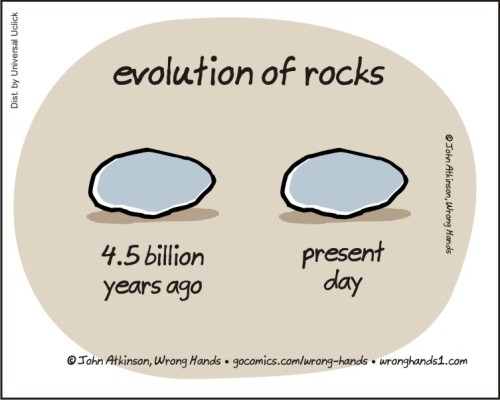ScholasticSpastic wrote:Ven. Kwan Tam Woo wrote:How is it an observed phenomenon?
Are you prepared, in this forum, to question whether natural selection is an observed phenomenon? Because it's at least as supported by observation as any astronomical phenomenon.
Yes I am - this is a
skeptics forum after all, and I see no good reason to limit my skepticism to fringe science and religious beliefs. Saying that it's as supported by observation as any astronomical phenomenon is not exactly a ringing endorsement.
How do you determine that one organism is "better" adapted to its environment then another, except in retrospect?
Um.... Nobody decides which organism is better adapted to its environment. The environment- the sum of all selective forces, including niche partitioning, resource allocation, mate selection events, and geographical ephemera, is what decides which organism is better adapted to its environment. And just because we usually tend to observe that it has happened in retrospect, this does not mean that our observations are any less relevant.
My question was how do you
determine that one organism is "better" adapted than another, except in retrospect? In other words I'm asking whether natural selection has any predictive power as a scientific hypothesis, or is it an exercise in post hoc rationalization? Case in point: your definition of the environment as "the sum of all selective forces" (including sexual selection, which can result in features that are *harmful* to an organism's survival). How can we possibly know what all these selective forces are beforehand, let alone how they sum together?
It's like saying "the hardest workers rise to the top of the corporate ladder". We start off with some preconceived notion of what it means to be a "hard working", e.g. putting in long hours. But as soon as we encounter corporate executives who don't have a history of working long hours, we can take advantage of the malleability (i.e. vagueness) of the term "hard working" and say that it is a combination of putting in long hours and schmoozing. And when we encounter execs who don't fit either of those categories, we just extend the definition of "hard working" even further to include picking the right projects and teams on which to work. And so on. But the more we take advantage of the inherent vagueness of the term "hard working", the less meaningful it becomes to say that "the hardest workers rise to the top" and the more impracticable it becomes to predict which present-day corporate underlings will rise to the top. Actually this analogy is deficient, because it only offers one highly malleable term in which to hide whereas natural selection offers two: "better" (or "fitter") and "environment". To say that present species have survived as opposed to extinct species because of natural selection is a tautology at best, and post-hoc circular reasoning at worst.
All of our observations of stars other than our sun are more than three years old. So maybe I should decide that astronomers aren't really observing anything important.

I don't see how that follows, nor how it relates to the topic at hand.
Many societies, and indeed many species, have managed to survive for long periods of time without any notion of "natural selection".
There you go demonstrating your ignorance regarding how natural selection works. It isn't a notion. It doesn't involve teleology of any sort. If I try to insert the actual scientific understanding of what natural selection is into your sentence, the result is gibberish.
Yes it is a notion. All theories and hypotheses are notions, including scientific ones. Natural selection is an interpretation of data, it is not the data itself. Perhaps the result is gibberish if you try to insert
your understanding of natural selection into my sentence.
Some of those societies even had major cultural institutions which ran counter to the ideology of natural selection (e.g. Buddhism).
Yet more demonstration that you haven't a clue how natural selection works or even what it is.
Then tell me what it is and how exactly it's supposed to work. Demonstrate to me that it means something more substantive and meaningful than "survival of the surviviest" or "survival of the luckiest".
Extinction would appear to be an inevitability; natural selection is, at best, something which delays the inevitable.
There is nothing about natural selection which delays extinctions. Extinctions are
part of the process of natural selection.
I agree that extinctions may be considered as the "negative" part of natural selection, (i.e. one organism survives at the expense of another organism going extinct).







